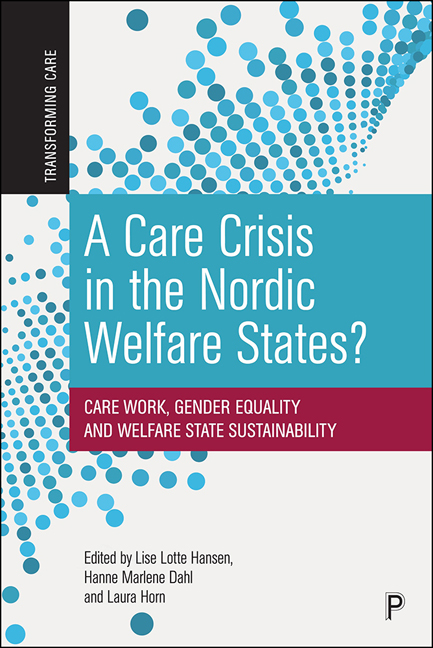 A Care Crisis in the Nordic Welfare States?
A Care Crisis in the Nordic Welfare States? Book contents
- Frontmatter
- Contents
- List of tables
- Notes on contributors
- Preface
- 1 Introduction: A care crisis in the Nordic welfare states?
- 2 The ‘care crisis’: its scientific framing and silences
- 3 Fraser’s care crisis theory meets the Nordic welfare societies
- 4 Crisis of care: a problem of economisation, of technologisation or of politics of care?
- 5 Deteriorating working conditions in elder care: an invisible crisis of care?
- 6 Managerialism as a failing response to the care crisis
- 7 ‘We are here for you’: the care crisis and the (un)learning of good nursing
- 8 Professionalisation of social pedagogues under managerial control: caring for children in a time of care crisis
- 9 Raising quality in Norwegian early childhood centres: (re)producing the care crisis?
- 10 Conclusion: Less caring and less gender-equal Nordic states
- 11 Postscript: A care crisis in the time of COVID-19
- Index
3 - Fraser’s care crisis theory meets the Nordic welfare societies
Published online by Cambridge University Press: 13 May 2022
- Frontmatter
- Contents
- List of tables
- Notes on contributors
- Preface
- 1 Introduction: A care crisis in the Nordic welfare states?
- 2 The ‘care crisis’: its scientific framing and silences
- 3 Fraser’s care crisis theory meets the Nordic welfare societies
- 4 Crisis of care: a problem of economisation, of technologisation or of politics of care?
- 5 Deteriorating working conditions in elder care: an invisible crisis of care?
- 6 Managerialism as a failing response to the care crisis
- 7 ‘We are here for you’: the care crisis and the (un)learning of good nursing
- 8 Professionalisation of social pedagogues under managerial control: caring for children in a time of care crisis
- 9 Raising quality in Norwegian early childhood centres: (re)producing the care crisis?
- 10 Conclusion: Less caring and less gender-equal Nordic states
- 11 Postscript: A care crisis in the time of COVID-19
- Index
Summary
Introduction
The aim of this chapter is to place Nancy Fraser's care crisis concept in the Nordic welfare society context. Fraser has developed her discussion of the care crisis with a focus mainly on the Anglo-American model, that is, in societies very different from the Nordic welfare model regarding the organisation of reproductive work, gender equality policies and labour market regulation. In her broad framework, ‘crisis of care’ is ‘best interpreted as a more or less acute expression of the social-reproductive contradictions of financialised capitalism’ (Fraser, 2016: 99, emphasis added). In this chapter, we argue that her understanding of the role of reproductive work in capitalist societies today, as well as the idea of a deepening care crisis also makes sense in a discussion of Nordic societies. There is, however, a need to take into account the historically specific institutional configurations, policies and social practices that render the dynamics of care crisis in the Nordic welfare states different and variegated, but nonetheless fundamentally engender crisis tendencies that are becoming more and more visible.
Fraser's main argument is that reproductive work is rendered invisible, even though it constitutes a necessary ‘background condition of possibility’ for production (Fraser, 2016). This argument is not new. Feminist care theorists argue that care is at the core of any society (for example Tronto, 1993, 2013, 2017; Kittay, 1999). Feminist economists (Dalla Costa and James, 1975; Waring, 1988; Ferber and Nelson, 1993; Henderson, 1996; Folbre, 2001, among others) have argued that all production of economic value is based on unpaid work and resources whose value – and costs – are not reflected in the formal economy, and that the appropriation of unpaid work and unvalued resources is central to the accumulation of capital on a global scale (Mies, 1986). In her pioneering study on the role of unpaid work in a Nordic welfare state context, the Norwegian sociologist Kari Warness (1978, 1984) argued that the (Norwegian) welfare state relied on women's unpaid care work. Fraser's contribution to this discussion lies in unambiguously linking the disregard and misrecognition of care to the sustainability of capitalism as a system (Fraser, 2014).
- Type
- Chapter
- Information
- A Care Crisis in the Nordic Welfare States?Care Work, Gender Equality and Welfare State Sustainability, pp. 39 - 59Publisher: Bristol University PressPrint publication year: 2021


